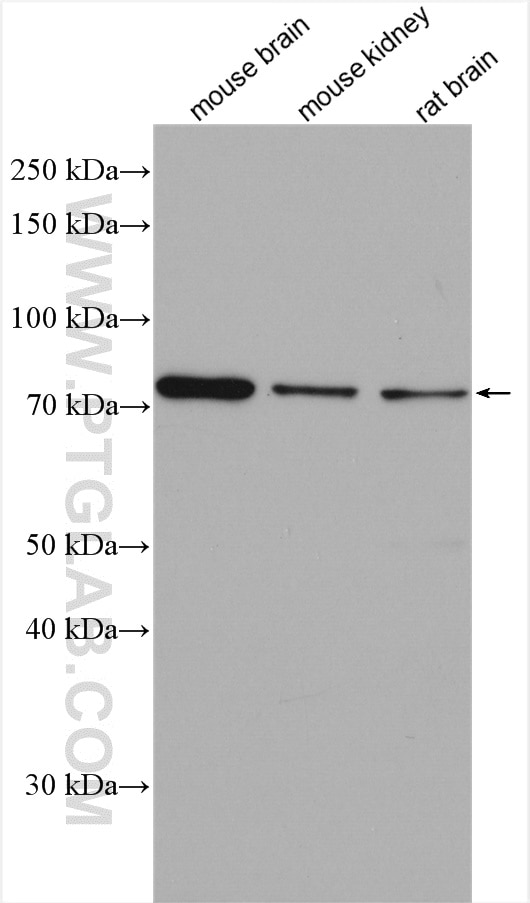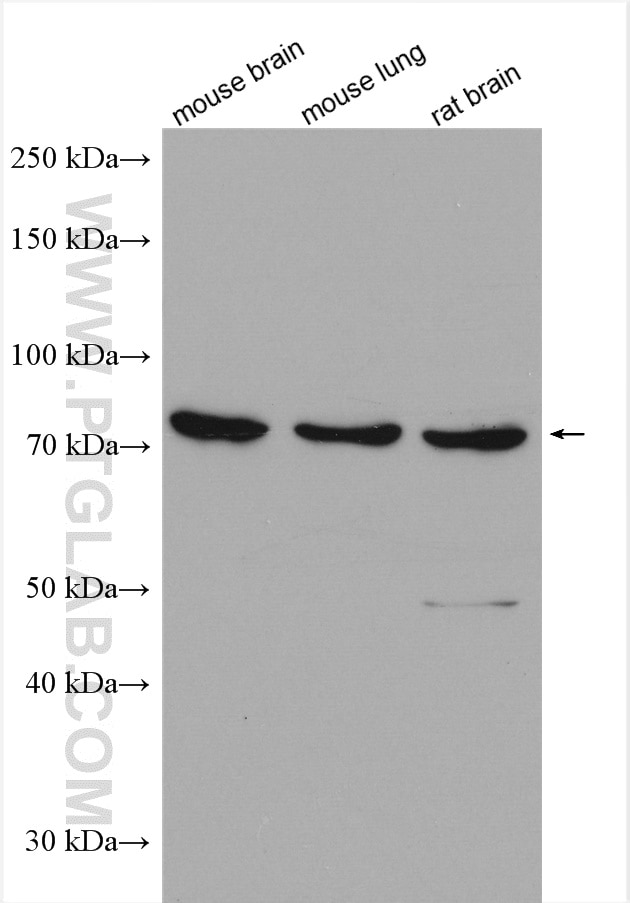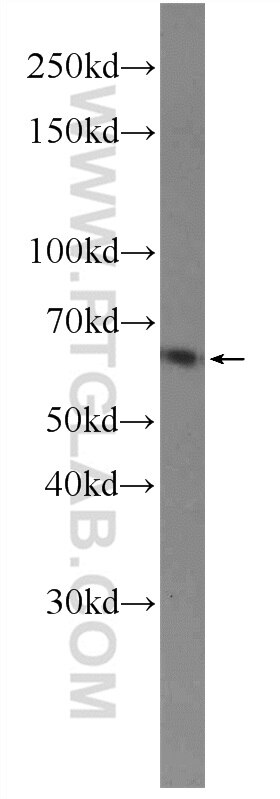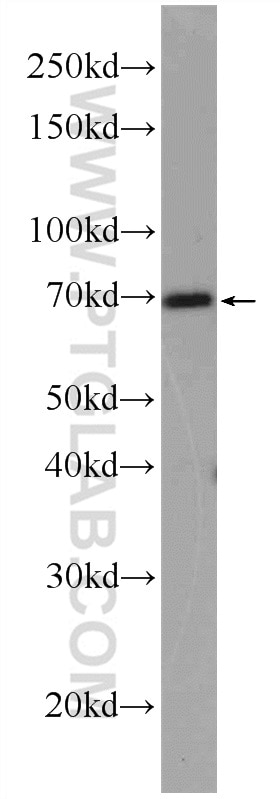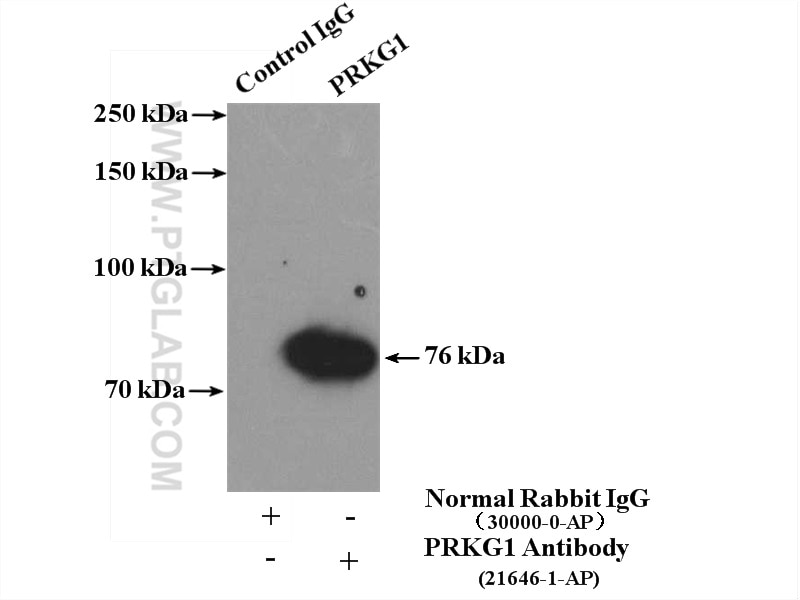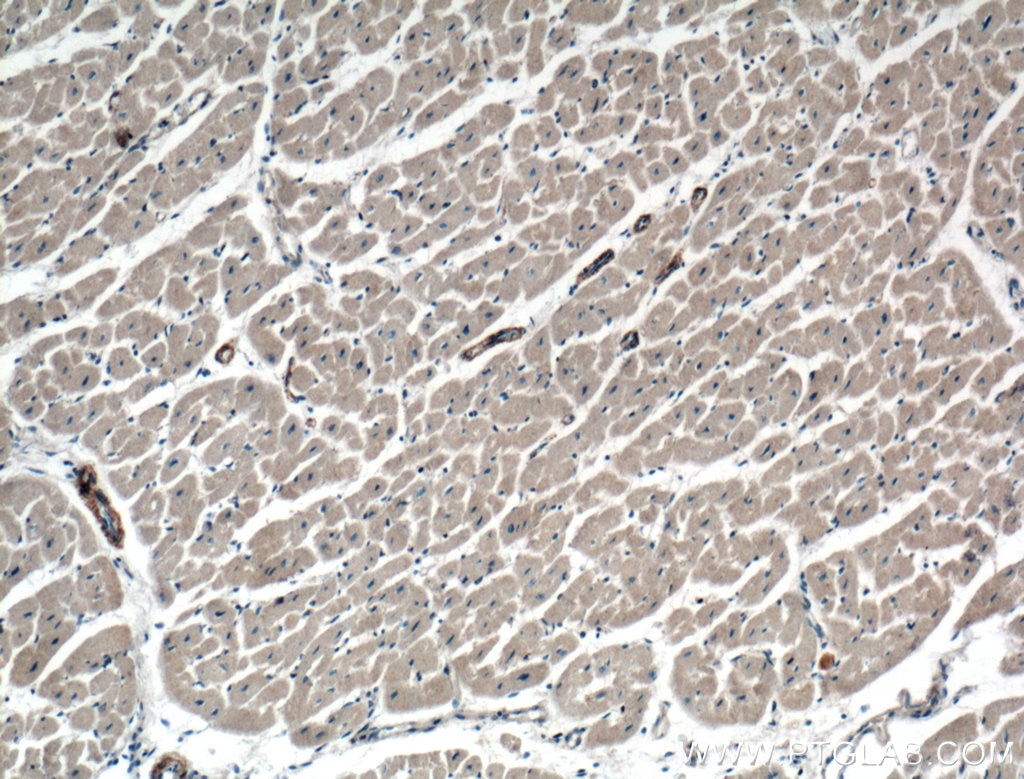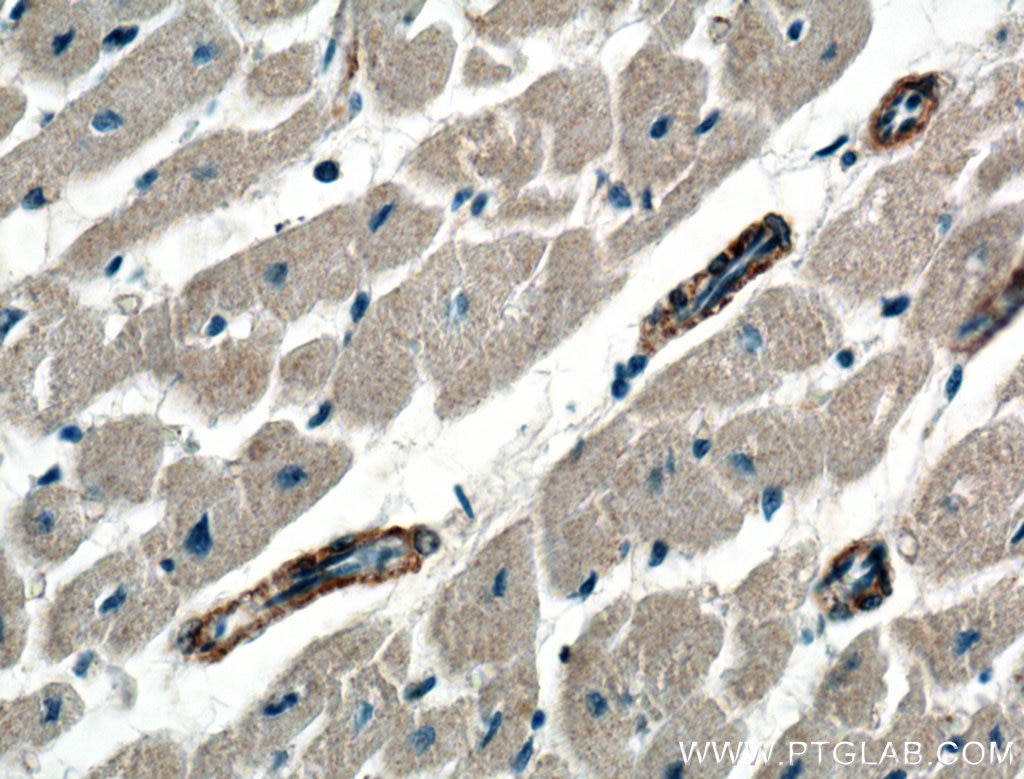- Featured Product
- KD/KO Validated
PRKG1 Polyklonaler Antikörper
PRKG1 Polyklonal Antikörper für IHC, IP, WB, ELISA
Wirt / Isotyp
Kaninchen / IgG
Getestete Reaktivität
human, Maus, Ratte und mehr (1)
Anwendung
WB, IP, IHC, ELISA
Konjugation
Unkonjugiert
Kat-Nr. : 21646-1-AP
Synonyme
Galerie der Validierungsdaten
Geprüfte Anwendungen
| Erfolgreiche Detektion in WB | Maushirngewebe, Mauslungengewebe, Mausnierengewebe, Rattenhirngewebe |
| Erfolgreiche IP | Maushirngewebe |
| Erfolgreiche Detektion in IHC | humanes Herzgewebe Hinweis: Antigendemaskierung mit TE-Puffer pH 9,0 empfohlen. (*) Wahlweise kann die Antigendemaskierung auch mit Citratpuffer pH 6,0 erfolgen. |
Empfohlene Verdünnung
| Anwendung | Verdünnung |
|---|---|
| Western Blot (WB) | WB : 1:1000-1:3000 |
| Immunpräzipitation (IP) | IP : 0.5-4.0 ug for 1.0-3.0 mg of total protein lysate |
| Immunhistochemie (IHC) | IHC : 1:50-1:500 |
| It is recommended that this reagent should be titrated in each testing system to obtain optimal results. | |
| Sample-dependent, check data in validation data gallery | |
Veröffentlichte Anwendungen
| KD/KO | See 1 publications below |
| WB | See 14 publications below |
| IHC | See 2 publications below |
Produktinformation
21646-1-AP bindet in WB, IP, IHC, ELISA PRKG1 und zeigt Reaktivität mit human, Maus, Ratten
| Getestete Reaktivität | human, Maus, Ratte |
| In Publikationen genannte Reaktivität | human, Maus, Ratte, Rind |
| Wirt / Isotyp | Kaninchen / IgG |
| Klonalität | Polyklonal |
| Typ | Antikörper |
| Immunogen | PRKG1 fusion protein Ag16333 |
| Vollständiger Name | protein kinase, cGMP-dependent, type I |
| Berechnetes Molekulargewicht | 686 aa, 78 kDa |
| Beobachtetes Molekulargewicht | 65-78 kDa |
| GenBank-Zugangsnummer | BC127090 |
| Gene symbol | PRKG1 |
| Gene ID (NCBI) | 5592 |
| Konjugation | Unkonjugiert |
| Form | Liquid |
| Reinigungsmethode | Antigen-Affinitätsreinigung |
| Lagerungspuffer | PBS mit 0.02% Natriumazid und 50% Glycerin pH 7.3. |
| Lagerungsbedingungen | Bei -20°C lagern. Nach dem Versand ein Jahr lang stabil Aliquotieren ist bei -20oC Lagerung nicht notwendig. 20ul Größen enthalten 0,1% BSA. |
Hintergrundinformationen
PRKG1(cGMP-dependent protein kinase 1) is also named as cGK1, PRKG1B, PRKGR1A, PRKGR1B and belongs to the cGMP subfamily. It serves as an integral component of second messenger signaling in a number of biological contexts including cell differentiation, memory, and vasodilation(PMID:21893290). Its activity prevents pathological-level nitric oxide-induced apoptosis and promotes DNA synthesis/cell proliferation in vascular smooth muscle cells(PMID:20060325). PRKG1 has 2 isoforms produced by alternative splicing with the molecular weight of 76 kDa and 78 kDa. The autophosphorylation can increase the kinase activity and it can form a monomer with the molecular weight of 65 kDa that is produced by proteolytic cleavage. SDS-PAGE revealed that proteolysis generated two different monomers with molecular masses of 70 and 68 kDa of CGK1-beta(PMID:8702828).
Protokolle
| Produktspezifische Protokolle | |
|---|---|
| WB protocol for PRKG1 antibody 21646-1-AP | Protokoll herunterladen |
| IHC protocol for PRKG1 antibody 21646-1-AP | Protokoll herunterladen |
| IP protocol for PRKG1 antibody 21646-1-AP | Protokoll herunterladen |
| Standard-Protokolle | |
|---|---|
| Klicken Sie hier, um unsere Standardprotokolle anzuzeigen |
Publikationen
| Species | Application | Title |
|---|---|---|
Environ Pollut Fluoride-induced unrestored arrest during haploid period of spermatogenesis via the regulation of DDX25 in rats. | ||
Clin Sci (Lond) Empagliflozin prevents cardiomyopathy via sGC-cGMP-PKG pathway in type 2 diabetes mice. | ||
Front Cell Dev Biol Myostatin Mutation Promotes Glycolysis by Increasing Phosphorylation of Phosphofructokinase via Activation of PDE5A-cGMP-PKG in Cattle Heart.
| ||
Front Pharmacol Emodin Interferes With Nitroglycerin-Induced Migraine in Rats Through CGMP-PKG Pathway. | ||
Cancer Cell Int NEK7 promotes gastric cancer progression as a cell proliferation regulator. | ||
Eur J Pharmacol A novel phosphodiesterase 9A inhibitor LW33 protects against ischemic stroke through the cGMP/PKG/CREB pathway. |
